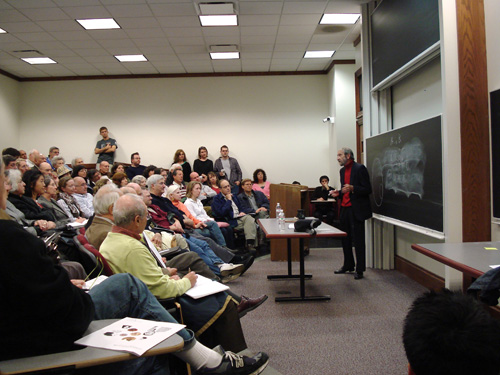| Sun | Mon | Tue | Wed | Thu | Fri | Sat |
|---|---|---|---|---|---|---|
| 1 | 2 | 3 | 4 | 5 | ||
| 6 | 7 | 8 | 9 | 10 | 11 | 12 |
| 13 | 14 | 15 | 16 | 17 | 18 | 19 |
| 20 | 21 | 22 | 23 | 24 | 25 | 26 |
| 27 | 28 | 29 | 30 | 31 |
CATEGORIES
RECENT ENTRIES
BLOG ROLL
Metaphor is forever
When the clock struck 4:30 p.m. this past Saturday—quitting time for the third and final session of the University’s 29th annual Humanities Day—dozens of liberal-arts enthusiasts who'd come to hear Chicago professors talk about Socrates and King Lear, J-pop, Erich Auerbach, African American literature's “Chicago Renaissance,” and the looting of the Baghdad Museum, put on their coats and walked out of Stuart Hall or the Classics Building into the afternoon chill. But in Harper 140, where philosopher Ted Cohen was discussing the Mystery of Metaphor, nobody stirred. An hour into his talk, Cohen was still unraveling nuances and delivering one-liners: "Thomas Hobbes inveighs against metaphor in a book he calls The Leviathan"; "Nietzsche likes metaphor, but as always with Nietzsche, it's very hard to tell what he's talking about." At 4:30 Cohen hadn't yet gotten to the Q&A.

Over the next hour, a few listeners trickled out of the standing-room-only lecture, but most stayed put as Cohen roamed from jazz to politics, poetry to moral philosophy. He quoted Hemingway, Churchill, Shakespeare, Donne's Meditation XVII ("so good, it's enough to make you a Christian—almost"), the Song of Songs, Joyce's "The Dead" ("the best short story written in English"), Rilke, and T. S. Eliot, whom Cohen, recalling the bleakness of The Waste Land and "The Hollow Men," teasingly called "you desiccated bastard."
In the end, metaphor remained mysterious. Cohen concluded that to function, a metaphor must break the rules of logic and language—"Macbeth doth murder sleep" is as impossible syntactically as it is practically—and argued that perhaps metaphors "aren't giving you meaning, but a picture of the world. ... 'Figurative' means, like a drawing." But truly, he lamented, "we can never solve any of these things." A few minutes later, however, he gave it another try: "A metaphor, even a pretty humble metaphor—'Juliet is the sun'; 'Mussolini is a utensil'—is a very small-scale work of art," Cohen said. "It took a certain kind of creativity to make it, and it takes a certain kind of appreciative talent to understand it. I like that idea. It's a romantic idea, but I like it."
And then, looking at his watch: "We probably should go. It’s nearly 5:30."
L.G.
October 27, 2008
